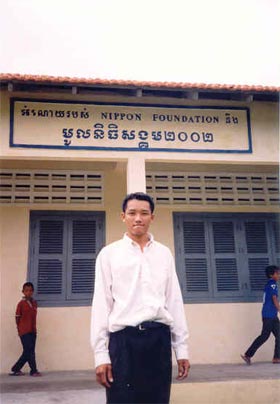The Cambodia Rural School Project
The Siem Bok Nippon
Foundation School

Hout Chhaya in front of the school
Hout Chhaya, 21, has been teaching at the Siem Bok Nippon Foundation School for two years.
| On the new building: |
As I have taught both in an old and new school, I can compare the two very well. I have to say that literally everything–building, desks, and chairs–is different now. The wall of the previous building, for example, was made of coconut leaves and the ceiling was thatched. It leaked all the time, and class had to stop whenever it rained. Now we have concrete walls and the weather is no longer a problem. Before, students were packed into the only two classrooms in the building. But now we have five rooms and enough space. We also have toilets in the new building. Although we still lack a proper water supply, and water has to be brought from the river, these changes have been dramatic for us. There are still several problems stopping children from coming to school. The biggest concern is that parents don’t always understand about education. I sometimes visit students’ families and try to explain why education is important, but they often refuse to listen to me. They want their children to work rather than study. There has been an effort by some NGOs and the UN to explain the importance of education to the villagers, but still it remains difficult to get children into school. It was actually the children themselves who changed their parents’ attitudes. At home, when children read newspapers to their parents, or even give them information important to their jobs on subjects like science and the weather, the parents realize the importance of knowledge. The parents became interested in the school and started pushing their children to attend. The number of students has doubled over the past six months with children coming from other villages. I would not say that the new school has solved all our education problems, but children and parents both feel positive about it and students are very aware of the importance of studying. Today, even though it’s vacation time, some students have still come in to learn. When I was a student, it was more difficult to study and I was always thinking about how I could learn more, but I got a job because I struggled hard. I believe children educated at the new school will have better job opportunities and will be able to develop the community.
|
| On himself:
|
I always wanted to be a civil servant and decided to be a public school teacher after completing my high school diploma. I attended teacher-training course for two years and passed an exam to work here, but I see my work here as a stepping stone to a better career in the future rather than a lifetime career. I’d like to work at a secondary school next. Although I’m from this province and have been in this village for two years, I still sometimes have difficulty understanding how things work here. I want to take more time to adjust myself to the village and the job. |

